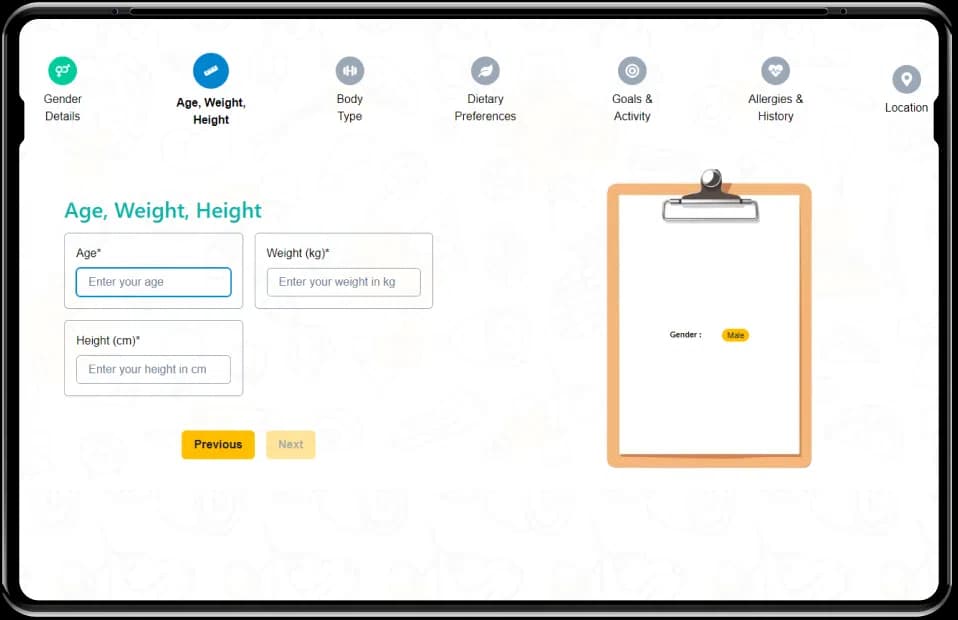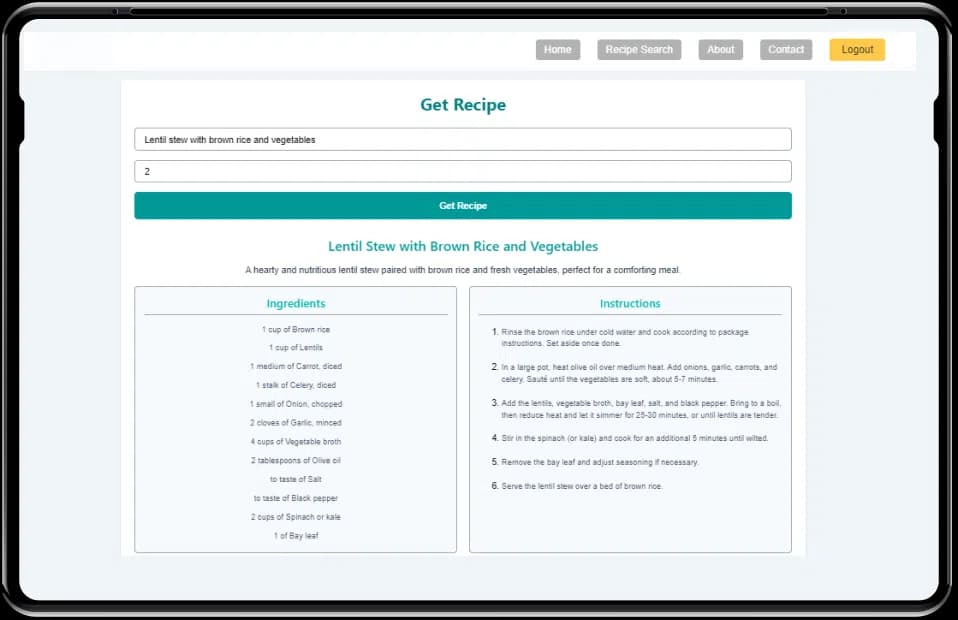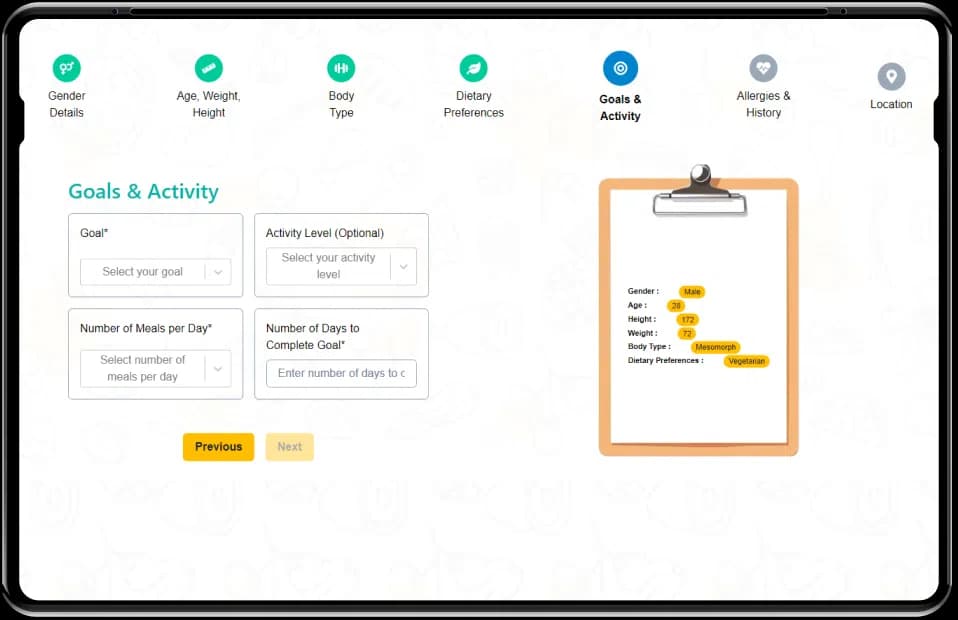Success Story
Developing an AI-driven diet management platform for a leading European healthcare provider
About the Client

The client is a Europe-based healthcare company focused on simplifying meal planning. It creates customized meal plans that cater to users' dietary preferences, goals, and schedules to make healthy eating accessible and convenient. Through an emphasis on empowering users, the client assists individuals in achieving their nutritional goals by offering personalized assistance tailored to their lifestyles.
Country
India
Industry
Healthcare
Services Used
Healthcare Software DevelopmentAI Development ServicesUI/UX Design Services
Business Situation
People looking for personalized nutrition advice often have trouble finding plans that fit their specific health needs, especially when it comes to using local foods. This challenge can lead to frustration and make it difficult to stick to recommended diets.
To bridge this gap, the client envisioned an AI-driven diet management platform capable of delivering precise, location-based diet plans tailored to individual requirements. The goal was to create a solution that considered personal specifics like dietary goals, fitness activity levels, medical conditions, allergies, and even past health history to make sure that users receive a holistic and effective diet plan.
By focusing on a deep level of customization, the platform aims to provide practical and achievable nutrition plans that seamlessly fit into users’ daily lives while supporting their long-term health objectives.
To turn this vision into a viable product, the client sought a technology partner with expertise in building market-fit solutions in the health tech space. This is where Daffodil Software stepped in for its proven ability to translate complex visions into robust, scalable software platforms.
Some of the primary requirements the client needed us to address were:
- ✔️
Design and strategize the complete development process for the diet management platform, recommending an optimal software architecture, technology stack and essential features.
- ✔️
Develop an intuitive and user-friendly interface that allows users to easily input their dietary preferences, medical conditions, and activity levels.
- ✔️
Integrate generative AI models capable of analyzing user inputs such as dietary goals, medical history, fitness levels, and allergies.
- ✔️
Incorporate a comprehensive, location-specific food database that suggests local foods and recipes, requiring real-time integration with geographic and nutritional databases for accurate recommendations.
- ✔️
Implement features to track and display holistic health insights, enabling users to monitor their progress over time, including weight changes, medical condition improvements, or increased energy levels.
The Solution We Provided
The development process for the personalized diet management platform began with an extensive product discovery phase. During this stage, we worked closely with the client to understand their vision and the specific needs of their users. Our Discover & Frame Workshop, designed to align user needs with project goals, helped outline the platform’s key features to ensure it catered to individual requirements and offered real-time, AI-driven diet recommendations. This phase also involved the creation of detailed user stories and personas, guiding the development team in building a product that meets the market’s expectations.
Following product discovery, the team moved to the technical architecture and planning phase. The platform’s architecture was built using modern web technologies, ensuring scalability, performance, and security. React.js was selected for the front end because of its component-based architecture, which allowed for a responsive and interactive user experience. The backend was developed using Node.js and Express, chosen for their efficiency in handling user data and processing it quickly. The database was structured using MongoDB, which provided the flexibility needed to store semi-structured user data, including health records and preferences. The critical component of the platform, GPT-4o mini, a lightweight version of GPT, was integrated into the backend. This was essential for generating AI-driven personalized diet plans based on user input.
The backend development played a central role in managing data flow. User inputs such as location, user specifications, health goals, and dietary restrictions were processed and sent to the GPT-4o mini AI model, which would then generate personalized diet recommendations. The backend was designed to securely handle sensitive user data, ensuring seamless integration with the AI model and real-time data processing.
Here’s how we helped the client amplify their product's features & capabilities:
User Profile
We employed a user profile feature specific to gender to make sure that the platform provides tailored diet suggestions that align with the differences between men and women. We included age, height and weight in the platform to evaluate the individualized caloric requirements and nutritional needs.
Customizable Recommendations
By considering these inputs, the platform provides personalized recommendations that adjust to each user’s body composition and support their specific health goals.

Location
We integrated capturing the location of the user to provide practical and realistic meal plans. Not all foods are universally available, so by accounting for geographical data, the platform recommends diets based on locally accessible ingredients.
Localized Diet Plans
This improves adherence to the diet plan and also ensures that users can easily employ the suggestions in their daily routine to make the diet more sustainable.

Customization
By focusing on personalized customization, the platform adapts to each user’s specific dietary needs, whether based on fitness goals, allergies, or preferences.
Personalized Diets
This approach provides practical recommendations that align with long-term health objectives, ensuring that users receive a holistic and effective diet plan.

Outcomes from the Customized AI-driven Diet Management Platform
The AI-driven diet management platform proved to be a game-changer for both the client and its users, delivering personalized meal plans that incorporate location and personal health data to support well-informed nutritional decisions. With over 15 diet types, including vegan, gluten-free, ketogenic, and heart-healthy, the platform caters to a diverse range of dietary needs. Covering more than 50 countries, it provided location-based meal suggestions using locally sourced ingredients, making diet plans practical and sustainable.
In its first three months, the platform experienced considerable growth, achieving a 50% increase in active users. Users expressed positive feedback, particularly highlighting the ability to adapt meal plans based on locally available foods as a key feature that enhanced adherence and long-term success. The real-time, AI-driven recommendations, powered by GPT-4o mini, enabled the platform to scale while maintaining high performance and personalization, helping the client stand out in a competitive market.
Read Related case studies
Let us understand your objectives and vision, set up milestones, estimate costs, and plan your project.
After the consulting session, walk away with:
- Validation of the idea/scope of your project
- Industry-specific best practices that can be applied to improve your project
- Implementation and engagement plan of action
- Ballpark estimate and timeframe of development
Fill out the form now or reach out to us at info@mcansey.com

